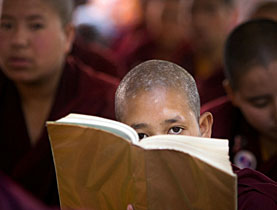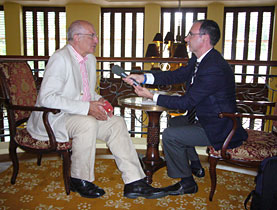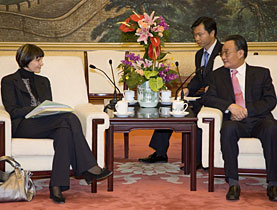Swiss urged to aid Sino-Tibet dialogue

As Tibetans mark the 50th anniversary of the exile of their spiritual leader, a Swiss expert on the region says Switzerland can help promote real dialogue with China.
Claude Levenson – a friend of the Dalai Lama and author of several books on Tibet – tells swissinfo that although Switzerland was among the first countries to welcome Tibetan refugees in the 1960s, its stance today is less bold.
Levenson, who has been following the Tibetan situation for 25 years, says Switzerland needs to show more courage in standing up to China.
Her concerns about the current situation in Tibet echo comments made by the Dalai Lama on Tuesday to mark the anniversary. He spoke of the “constant fear” of Tibetans in Tibet and the danger of “extinction” their culture faces.
swissinfo: March 10, 2009 marks the 50-year exile of the Dalai Lama from Tibet. What does this anniversary signify?
Claude Levenson: This anniversary is important. Despite being occupied for 60 years and having been deprived of their spiritual leader for the past 50 years, Tibetans have shown that they can resist without violence, that they exist and want to remain Tibetans, even at the cost of their lives. It is an example that is almost unparalleled in the world.
swissinfo: Is this anniversary felt the same way in Tibet and among Tibetans in exile?
C.L.: Yes, although the way in which it is expressed is very different. In exile, one generation has followed the other in a climate that is more democratic, more open – people have adapted well to the outside world. They have retained their essential difference, but enjoy the same rights as other citizens in the countries where they live.
In Tibet itself, there is oppression and, since last year at any rate, there has been a visible, palpable increase in repression. Arrests and raids have continued, it is forbidden to demonstrate, many monasteries are under surveillance. There is no freedom of speech for Tibetans under these conditions.
However, actions and protests by Tibetans on the outside do have an impact in Tibet itself. Tibetans are encouraging one another to show that after 50 years and the departure into exile of the Dalai Lama and of hundreds of thousands of Tibetans, Tibet now exists on two fronts: the Tibet inside and the Tibet outside.
swissinfo: What is the atmosphere like in Tibet? Is there hope or are people resigned?
C.L.: Tibet is completely cut off from the world and Lhasa has been off limits to foreigners since February 28. Not much news is getting through, but those reports that we are getting all agree with each other.
According to the few eyewitness accounts by foreigners – mostly journalists based in Beijing – Tibetans are not demonstrating because they are afraid and are closely watched, with the army deployed in Tibetan towns.
The scarce snippets of information passed via family connections agree in confirming that Tibet has returned to the terrible era of the Cultural Revolution – abuse, fear and being unable to say what one thinks or believes.
Resigned? I don’t think so. If the Tibetans were resigned, they wouldn’t have demonstrated like they did last year. Hope? Certainly. They want to preserve what they can of their traditions and their civilization. Hope and small acts of resistance are vital principles for them.
swissinfo: Is it fair to say that Switzerland is distancing itself from the Tibetan issue?
C.L.: Unfortunately, yes. Switzerland, like other countries, is taking a position that is clearly more distanced. Switzerland recognised China very early, but it was also the first European country to take in 1,000 Tibetan refugees as of 1960, in the wake of the exile that started in March 1959.
Politically, Switzerland was much less cautious than it is today about this issue, and thus about the defence of human rights and protection of refugees.
In 1960s and 70s, the government rejected a threatening letter from the Chinese embassy protesting over the welcome given to Tibetan refugees. Today, in the face of the outcry from the Chinese authorities about the Dalai Lama, politicians in Switzerland, as elsewhere, are pulling back. It’s sad.
To defend the freedom of Tibetans is to defend our own freedom. If it is possible, whether here or elsewhere, to defend the Tibetans’ right to self-determination, that shows free speech is possible. If we stay silent we put ourselves in danger of tomorrow being gagged ourselves.
swissinfo: How do you explain Switzerland’s reluctance to be involved?
C.L.: Like everyone else, Switzerland is afraid of offending the sensibilities of the Chinese regime and fears the economic power of China. It’s a rising power that has the financial and economic means to command respect and claims to be peaceful – although we may doubt that if we look at the significant military budget increase that has just been approved.
swissinfo: On the Tibet issue, what else should Switzerland be doing?
C.L.: It should show more courage in defending its own principles.
Since it claims to be friend of the Chinese regime and its leaders, Switzerland should try to convince them to accept its good offices, which could perhaps one day make it possible to start real negotiations between Tibetan and Chinese officials. But this can only be done in cooperation with other democratic countries.
In addition, – and this is true for Switzerland and for most Western countries – we must forbid ourselves to be afraid. Fear is always a bad guide.
swissinfo-interview: Pierre-François Besson
Switzerland supports dialogue between the Chinese authorities and Tibetan religious leaders, including the Dalai Lama, says foreign ministry spokesman Andreas Stauffer.
The international community, including Switzerland, recognises Tibet as an autonomous region of China, ranked as a province since 1951, the ministry says.
Switzerland does not recognise the Tibetan government-in-exile based in Dharamsala, India and has no formal contact with its representatives.
The ministry argues that only dialogue can resolve the Tibetan issue in a way that is appropriate for an autonomous region and with respect for human rights, including the issue of religious freedom and cultural rights.
Switzerland says Tibet is among its areas of concern which it regularly raises with China.
On the multilateral level, in the Universal Periodic Review of the Human Rights Council, Switzerland has been one of the few countries to explicitly express its concern over minority rights, particularly in Tibet and Xinjiang.
Switzerland was the first Western country to institutionalise a human rights dialogue with China. This dialogue, launched in 1991, has resulted in regular meetings between the two countries. The 10th round of talks were held in Beijing in July 2008 and the 11th is planned for this summer.
In 1950 the Chinese army defeats the Tibetan army in its campaign to integrate Tibet into the People’s Republic of China.
From 1956 onwards, Tibetans revolt against their Chinese “occupier” and in March 1959, insurgency erupts in the capital, Lhasa.
Shortly after the start of the uprising the Dalai Lama leaves the country for India, followed by tens of thousands of Tibetans.
The Tibetan self-proclaimed government-in-exile says there have been serious and systematic violations of human rights stemming from the “occupation” by China.
Between 1951 and 1979, 1.2 million Tibetans died and 80,000 were forced into exile, according to the Tibetan government-in-exile.
In March 2008, some 200 Tibetans were killed during demonstrations, Tibetan exiles say. For its part, Beijing says Tibetan rioters killed 21 people.

In compliance with the JTI standards
More: SWI swissinfo.ch certified by the Journalism Trust Initiative













You can find an overview of ongoing debates with our journalists here . Please join us!
If you want to start a conversation about a topic raised in this article or want to report factual errors, email us at english@swissinfo.ch.